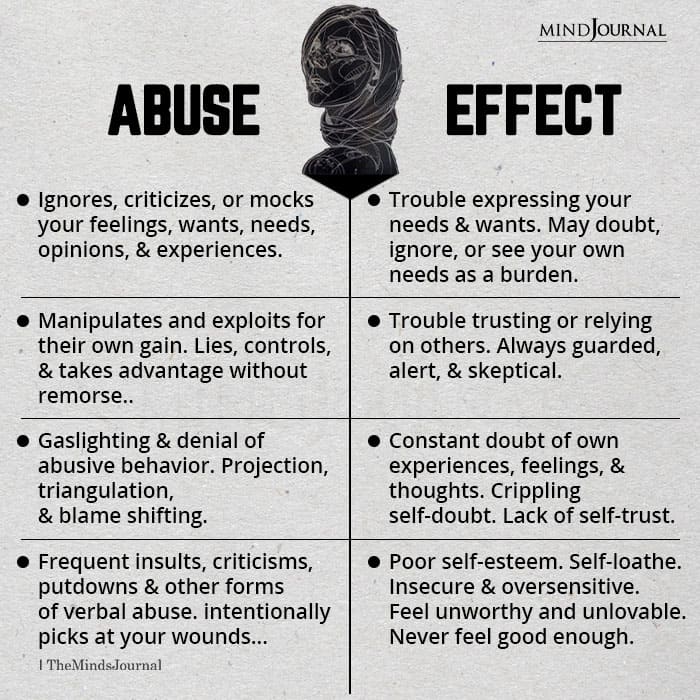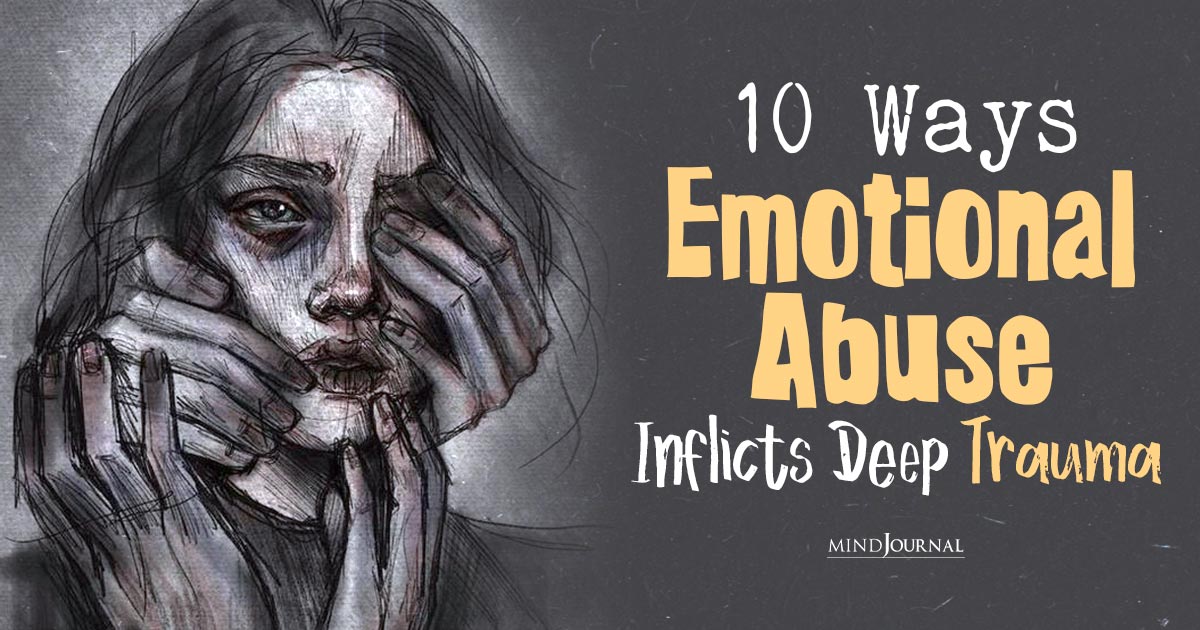More than any kind of abuse, emotional abuse is traumatizing, leaving lasting scars on the soul. Here are 10 effects of emotional abuse on a person.
Emotional abuse has become more common and accepted in politics and the media. It’s widespread and under-reported, but should not be ignored.
It can be more harmful than physical abuse, which is almost always preceded by emotional abuse and trauma. Emotional abuse includes mental, psychological, verbal, and financial abuse.
Sometimes it’s overt and easily spotted, such as verbal attacks and threats, but other times it’s covert, subtle, or passive-aggressive.
Abusers’ goal is to increase their power in the relationship. They’re often skilled manipulators. This is especially true of narcissists, who engage in narcissistic abuse.
Abuse can also take the form of intentionally withholding communication and affection or gaslighting that is designed to make you doubt your mind, memory, and perceptions.
Gaslighters may even act concerned and try to be helpful to confuse you. They may act offended and like they have no idea why you are upset.
Read The 8 Types Of Emotional Wounds and How To Heal Them

If you have been treated this way in past relationships, it’s familiar and hard to recognize. You may not have had a healthy relationship for comparison.
When abuse takes place in private, there are no witnesses to validate your experience. Other aspects of the relationship may work well. The abuser may be caring between abusive episodes so that you minimize, excuse, or forget them.
10 Lasting Effects Of Emotional Abuse
Ten reasons why you should take emotional abuse seriously and get professional help are explained below:
1. Emotional abuse lowers your self-esteem.
Abusers avoid responsibility for their behavior and frequently use blame and shame to deflect responsibility and exert their power. You begin to feel less confident and competent.
If your personal boundaries are weak, you accept the blame, which undermines your self-esteem and feelings of worth, lovability, and adequacy.
This usually happens when you’ve been subjected to emotional abuse in your past, likely in your childhood, when you accepted your parents’ authority.
You may have been codependent before this relationship, but abuse worsens your symptoms (see The Stages of Codependency).
2. Emotional abuse distorts your perception of reality.
Abusers disagree with and undermine your perceptions. They insist that only their versions of you, other people, and events are accurate.
In time, your outlook and perceptions become skewed, and you begin to see reality through your partner’s eyes, including how you see yourself, as described in 1, above.
3. You lose trust in yourself and other people.
Frequent criticism, blaming, undermining, and shaming instill self-doubt. You become risk averse, not wanting to displease your partner or make mistakes.
These are also symptoms of low self-esteem. To add to your sense of insecurity, you may begin to distrust other people. Often this is the abuser’s intention and a direct result of abusive comments.
Doubting your perceptions, attractiveness, decisions, and your financial and emotional ability to survive on your own makes it harder to leave.
4. Emotional abuse may isolate you from friends, family, and help.
Many abusers try to isolate you from associations with other people to maintain control. They don’t want you to trust or rely on anyone else so that you will believe and be loyal only to them.
This is because they’re so insecure. They may undermine your other relationships by refusing to participate, by challenging your loyalty, or by planting seeds of distrust in others.
They may suggest that your family or friends don’t support your best interest. Additionally, due to your growing shame, you may socialize less and hide abuse that you find humiliating from other people, further isolating yourself.
5. Emotional abuse may be subtle and be dismissed as harmless.
As mentioned above, it may be hard to tell whether you’re being abused when sarcasm or passive-aggression is used.
Your protests may be met with, “You’re too sensitive,” “You’re exaggerating,” or “You don’t remember things correctly.”
This is typical gaslighting behavior. You may frequently be told that you can trust the abuser, so you do. Constant criticism designed to be helpful can slowly undermine your confidence.
Abuse may be couched in flattery, such as, “In some areas you’re good, so why are you so inept as a mother?”
Motivated by jealousy and the need for control, an abuser might subtly undermine your achievements and goals to deter you from becoming more accomplished and independent. Even if you recognize abuse, you may be in denial about its harmful effect on you.
Read How Toxic Mothers Can Ruin Their Child’s Chance At Happiness
6. You can become trauma-bonded to the abuser.
Abusive relationships in general are hard to leave. Where there’s a power imbalance and recurring abuse mixed with good treatment, a trauma bond can be formed.
The intermittent positive reinforcement keeps you connected and enables the abuser to control you with fear, unpredictability, belittling, and control. You start to develop “learned helplessness” and feel powerless and trapped.
7. Emotional abuse can cause long-term damage, such as PTSD.
You won’t realize you’re being damaged, just like you might not notice that you’re aging a little bit every day. Then one day you wonder what happened to your old confident, energetic self.
If you found the courage to leave, you may have believed you were fine, but not realized you have symptoms of post-traumatic stress disorder and other problems and trauma from the abuse.
8. Emotional abuse affects your health, including mood and stress disorders.
Abuse that is severe or chronic can affect your brain. Aside from PTSD, you may develop anxiety, depression, compulsive behaviors, or an addiction, like an eating disorder.
You may have physical symptoms that affect your sleep, heart, TMJ, allergies, sciatica, and immune and digestive systems.
9. You can lose your sense of self, your power, and your identity.
Over time you become more dependent on your partner and give up your autonomy. You squelch your feelings, needs, and wants. You go along to get along.
You start to mold yourself to your partner’s wishes, do less on your own, and may abandon your previous interests and friends.
This further empowers the abuser and diminishes you. The abuser may frame things so that you must choose between yourself and him/her and the relationship, and you accommodate to avoid conflict.
You’re more susceptible to this manipulation if you married young or were codependent prior to meeting your partner.
With a weak sense of self, you automatically sacrifice and lose yourself, your interests, and even your values to stay connected and in the relationship. That becomes your highest priority especially once a trauma bond is formed.
10. You may fear getting close in new relationships.
When you leave you’ll face new issues. For example, you may look forward to new relationships but may find it hard to trust.
You may be leery of losing your newfound freedom or repeating an abusive relationship. You also may attract new partners who are emotionally unavailable to avoid intimacy and be hurt all over again.
The good news is that you can recover from emotional abuse and trauma. Read The Promises of Recovery.
With professional help, you begin to build your own identity, self-esteem, and the ability to assertively express feelings, wants, and needs.
You learn self-responsibility, boundaries, and self-care. Psychotherapy can include healing childhood trauma and PTSD. Meanwhile, don’t wait. Start to recover, and change the balance of power.
Written By Darlene Lancer JD LMFT Originally Appeared On whatiscodependency
So, those are the ten effects of emotional abuse that can give anyone long-lasting trauma. If you can relate to these effects, it’s important to identify emotional abuse and seek help.













Leave a Reply